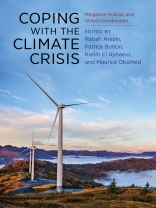Reducing carbon emissions is the most complex political and economic problem humanity has ever confronted. Coping with the Climate Crisis brings together leading experts from academia and policy circles to explore issues related to the implementation of the COP21 Paris Agreement and the challenges of accelerating the transition toward sustainable development.
The book synthesizes the key insights that emerge from the latest research in climate-change economics in an accessible and useful guide for policy makers and researchers. Contributors consider a wide range of issues, including the economic implications and realities of shifting away from fossil fuels, the role of financial markets in incentivizing development and construction of sustainable infrastructure, the challenges of evaluating the well-being of future generations, the risk associated with uncertainty surrounding the pace of climate change, and how to make climate agreements enforceable. They demonstrate the need for a carbon tax, considering the issues of efficiently pricing carbon as well as the role of supply-side policies on fossil fuels. Through a range of perspectives from academic economists and practitioners in the public and private sectors who work either at the country level or under the auspices of multilateral organizations, Coping with the Climate Crisis outlines what it will take to achieve a viable, global climate-stabilization path.
İçerik tablosu
Foreword, by Nizar Baraka, President of the Scientific Committee of COP22
Acknowledgments
Introduction, by Rabah Arezki, Patrick Bolton, Karim El Aynaoui, and Maurice Obstfeld
Part I: The Energy Transition and Its Consequences
1. Reducing Energy Greenhouse Gas Emissions to Meet Our Climate Goals: An Overview, by Philippe Benoit
2. Transitional Risks and the Safe Carbon Budget, by Rick van der Ploeg
Part II : Carbon Pricing and Dealing with Uncertainty
3. Fighting Climate Change and the Social Cost of Carbon, by Christian Gollier
4. How Should Countries Price Fossil Fuels?, by Ian Parry
5. Should Carbon Pricing Be Different Across Countries?, by Katheline Schubert
6. Needed: Robustness in Climate Economics, by Ted Loch-Temzelides
Part III : Implementing Climate Agreements
7. Improving Paris: Credibility, Technology, and Conservation, by Bård Harstad
8. Can a Uniform Carbon-Price Commitment Help to Resolve the Global Warming Problem?, by Martin L. Weitzman
9. Addressing Climate Change: Does the IMF Have a Role?, by Maurice Obstfeld
10. Post-Paris Clean Energy Options for China, by Ujjayant Chakravorty, Carolyn Fischer, and Marie-Helene Hubert
Part IV : Finance and Sustainable Infrastructure
11. Financing Sustainable Infrastructure, by Thierry Déau and Julien Touati
12. Climate Change: A Policy-Making Case Study of Capital Markets’Mobilization for Public Good, by Jean Boissinot and Frédéric Samama
Contributors
Index
Yazar hakkında
Patrick Bolton is the David Zalaznick Professor of Business at Columbia Business School. He is the co-author of Contract Theory (MIT Press, 2005) and the co-editor of Credit Markets for the Poor (Russell Sage Foundation, 2005).












